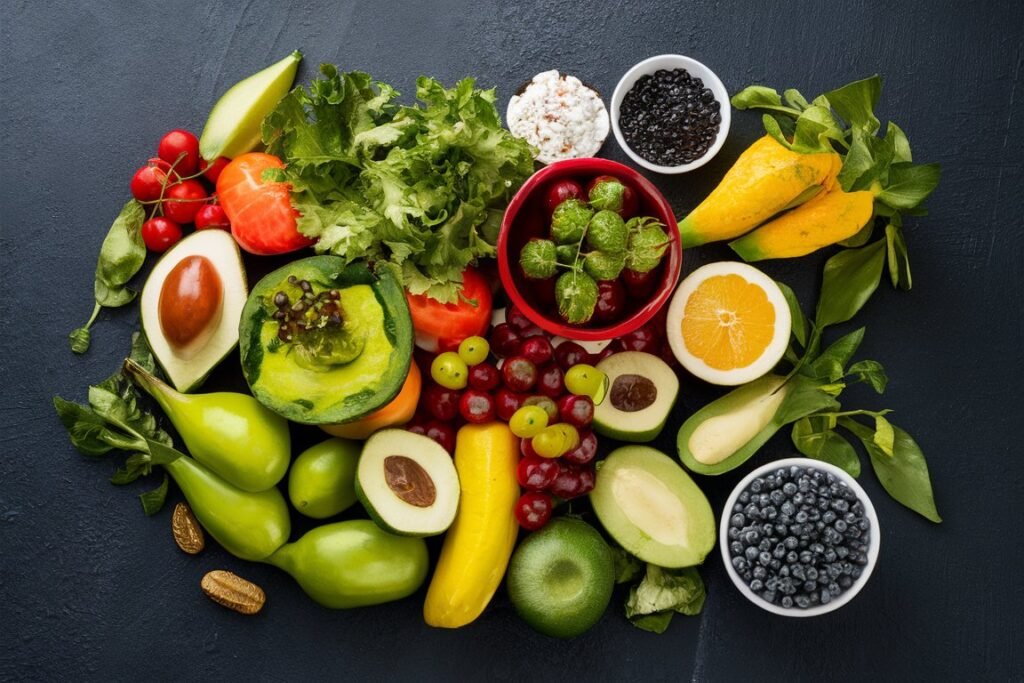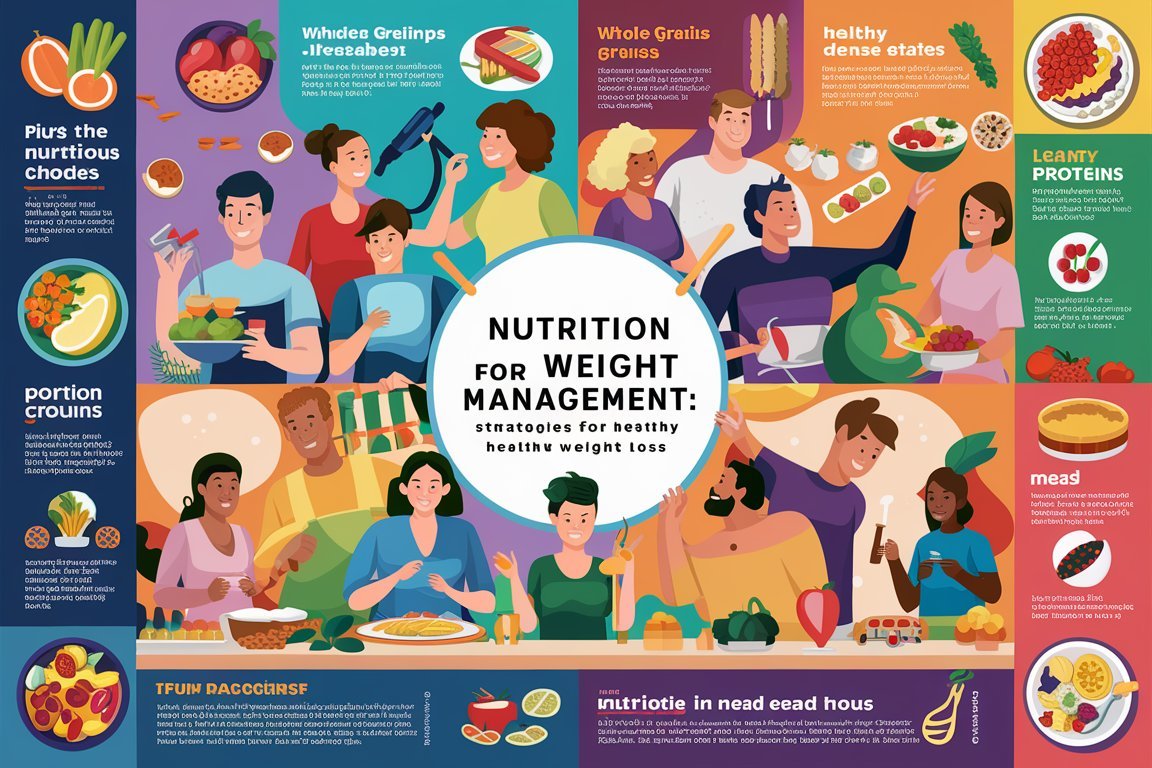Nutrition for Weight Management: Strategies for Healthy Weight Loss
Hey there, my young and curious friends of 2024! It’s your nutrition buddy from the past, Nita Sharda, here to take you on an exciting and empowering journey into the world of nutrition for weight management – the secret to feeling your best and living your healthiest life!
Now, I know that the words “weight loss” and “nutrition” might sound a little scary or even boring at first, like something only grown-ups talk about. But trust me, once you discover how amazing and delicious healthy eating can be, and how it can help you feel strong, energized, and confident in your own skin, you’ll never look at food the same way again!
So, are you ready to become a nutrition superhero and learn about all the incredible ways you can take care of your body and mind through healthy eating and weight management? Let’s dive in!
What is Weight Management?
First things first, let’s talk about what we mean when we say “weight management.” Weight management simply means taking steps to achieve and maintain a healthy weight for your body type and lifestyle.
This doesn’t mean trying to be as skinny as possible or following strict diets that make you feel deprived and cranky. Instead, it means learning to listen to your body’s needs, fueling it with nutritious and delicious foods, and finding a balance that works for you.
Why is Weight Management Important?
So, why is weight management so important for our overall health and well-being? Let’s take a closer look at some of the amazing benefits of achieving and maintaining a healthy weight.
Reduces Risk of Chronic Diseases
One of the biggest benefits of maintaining a healthy weight is that it can help reduce your risk of developing chronic diseases like heart disease, diabetes, and certain types of cancer.
When we carry excess weight, especially around our midsection, it can put extra strain on our organs and increase inflammation in the body, which can lead to these serious health problems over time.
But by achieving and maintaining a healthy weight through nutritious eating and regular physical activity, we can help keep our bodies strong and resilient against these diseases.
Boosts Energy and Mood
Another great benefit of weight management is that it can help boost your energy levels and improve your overall mood and mental well-being.
When we’re carrying excess weight, it can make us feel sluggish, tired, and even depressed or anxious. But when we’re fueling our bodies with nutritious foods and engaging in regular physical activity, we can feel more energized, focused, and positive throughout the day.
Plus, when we feel good about our bodies and our health, it can give us a big confidence boost and help us feel more comfortable and happy in our own skin.
Improves Physical Functioning
Maintaining a healthy weight can also help improve our physical functioning and make it easier to do all the things we love to do, like playing sports, dancing, or exploring the great outdoors.
When we’re carrying excess weight, it can put extra strain on our joints and muscles, making it harder to move around and be active. But by achieving and maintaining a healthy weight, we can help reduce this strain and improve our overall physical functioning and mobility.
Nutrition Strategies for Healthy Weight Loss

Okay, so now that we know why weight management is so important, let’s talk about some nutrition strategies for achieving and maintaining a healthy weight in a safe and sustainable way.
Focus on Whole, Nutrient-Dense Foods
One of the most important things you can do for healthy weight loss is to focus on eating whole, nutrient-dense foods that give your body the fuel it needs to thrive.
This means choosing foods like:
- Fruits and vegetables in all the colors of the rainbow
- Whole grains like brown rice, quinoa, and whole wheat bread
- Lean proteins like chicken, fish, tofu, and legumes
- Healthy fats like avocado, nuts, and olive oil
These foods are packed with essential vitamins, minerals, and fiber that help keep you feeling full, energized, and satisfied throughout the day, without weighing you down or causing blood sugar spikes and crashes.
Practice Portion Control
Another important nutrition strategy for healthy weight loss is to practice portion control, which means being mindful of how much food you’re eating at each meal and snack.
It’s easy to overeat when we’re not paying attention to our portion sizes, especially when we’re eating out or snacking on the go. But by using simple tools like measuring cups, food scales, or even your own hand as a guide, you can start to get a better sense of what a healthy portion looks like for different types of foods.
Some general guidelines for portion control include:
- Filling half your plate with fruits and veggies at each meal
- Choosing lean proteins that are about the size of your palm
- Limiting starchy carbs like rice or pasta to about a fist-sized portion
- Using healthy fats like olive oil or nuts sparingly, about a thumb-sized portion
By being mindful of your portion sizes and focusing on nutrient-dense foods, you can help ensure that you’re getting the fuel your body needs without overdoing it on calories.
Stay Hydrated
Staying hydrated is another key nutrition strategy for healthy weight loss, as it can help keep you feeling full and satisfied between meals and prevent overeating.
Aim to drink at least 8 cups of water per day, and more if you’re physically active or spending time in hot or humid weather. You can also get hydration from other beverages like herbal tea, coconut water, or water-rich foods like fruits and veggies.
Just be sure to limit sugary drinks like soda, sports drinks, and fruit juices, as these can add a lot of empty calories and contribute to weight gain over time.
Eat Mindfully
Mindful eating is another important nutrition strategy for healthy weight loss, as it can help you tune into your body’s hunger and fullness cues and make more intentional choices about what and how much to eat.
Some tips for practicing mindful eating include:
- Eating slowly and without distractions like TV or phones
- Paying attention to the flavors, textures, and aromas of your food
- Checking in with your hunger and fullness levels before, during, and after meals
- Honoring your cravings and choosing foods that truly satisfy you
By eating mindfully and listening to your body’s needs, you can start to develop a healthier and more intuitive relationship with food that supports your weight management goals.
Plan Ahead
Finally, planning ahead is a key nutrition strategy for healthy weight loss, as it can help you make healthier choices even when you’re short on time or energy.
Some tips for planning ahead include:
- Making a weekly meal plan and grocery list based on nutrient-dense, whole foods
- Prepping meals and snacks in advance, like chopping veggies or cooking big batches of grains or proteins
- Packing healthy snacks and meals to take with you on the go
- Having quick and easy meal options on hand, like frozen veggies or canned beans
By planning ahead and being prepared with healthy options, you can help set yourself up for success and make it easier to stick to your nutrition goals even when life gets busy.
The Power of Nutrition: A Message of Empowerment
Wow, we’ve covered a lot of ground today, my young nutrition superheroes! We’ve learned about the incredible power of nutrition to support healthy weight management and overall well-being, and we’ve discovered some simple and delicious strategies for fueling our bodies with the good stuff.
I know that sometimes, making healthy choices can feel hard or even scary, especially when we’re surrounded by tempting junk foods and conflicting messages about what we “should” eat. But I want you to remember that YOU have the power to take control of your health and your future, one bite at a time.
Healthy eating isn’t about restriction, deprivation, or fitting into someone else’s idea of what you “should” look like. It’s about nourishing your body and mind with the foods that make you feel your best, and finding a balance that works for YOU.
So, my young friends, I encourage you to approach nutrition and weight management with curiosity, compassion, and a sense of adventure. Try new foods, experiment with different flavors and cooking methods, and most importantly, listen to your body and honor its needs.
Remember, you are the expert on your own body and your own health. Trust your instincts, surround yourself with supportive people who lift you up, and never be afraid to ask for help when you need it.
You have the power to create a healthy, happy, and vibrant life for yourself, one delicious and nutritious bite at a time. So go out there and be the nutrition superhero you were born to be!













2 Comments